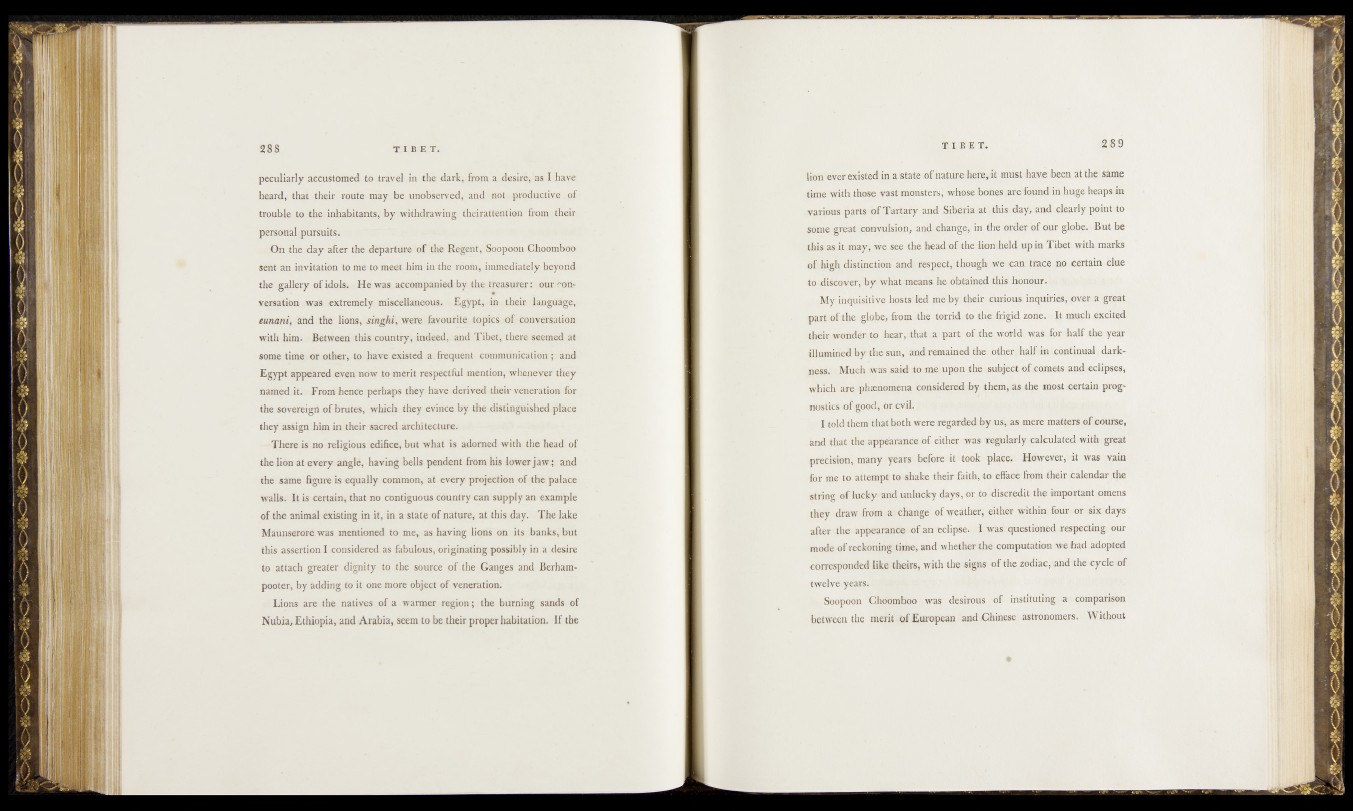
peculiarly accustomed to travel in the dark, from a desire, as I have
heard, that their route may be unobserved, and not productive of
trouble to the inhabitants, by withdrawing then-attention from their
personal pursuits.
On the day after the departure of die Regent, Soopoon Ghoomboo
sent an invitation to me to meet him in the room, immediately beyond
the gallery of idols. He was accompanied by the treasurer : our com
versation was extremely miscellaneous. Egypt, in their language,
eunani, and the lions, singhi, were favourite topics of conversation
with him. Between this country, indeed, and Tibet, there seemed at
some time or other, to have existed a frequent communication ; and
Egypt appeared even now to merit respectful mention, whenever they
named it. From hence perhaps they have derived their veneration for
the sovereign of brutes, which they evince by the distinguished place
they assign him in their sacred architecture.
There is no religious edifice, but what is adorned with the head of
the lion at every angle, having bells pendent from his lower jaw ; and
the same figure is equally common, at every projection of the palace
Walls. It is certain, that no contiguous country can supply an example
of the animal existing in it, in a state of nature, at this day. The lake
Maunserorô was mentioned to me, as having lions on its banks, but
this assertion I considered as fabulous, originating possibly in a desire
to attach greater dignity to the source of the Ganges and Berham-
pooter, by adding to it one more object of veneration.
Lions are the natives of a warmer region ; the burning sands of
Nubia, Ethiopia, and Arabia, seem to be their proper habitation. If the
lion ever existed in a s tate 'of nature here, it must have been at thp same
time with those vai&muBSterajWihose bones are found 3,n:huge heaps in
various parts of Tartary and. Siberia at this A y , and clearly point to
some great convulsion, anj|ichange, in the order of our globe. But be
this as it may, we see the head of the lionjbieldupin Tibet with marks
of high distinction and respect, though we can tuace no certain clue
to discover, by what means lie obtained this honour.
My inquisitive hosts led me by their curious >kquirim,<0ve»?a great
part of the globe, from the torrid to the frdgid zone. It much excited
their wonder to hear, that aipaft; of the world was fin-.half the year
illumined b y the sun, and remained the o iie rs half; h i continual darkness.
Much was'said, to me upon the subject of comets and eclipses,
which' are phenomena considered by them, as the most certain prognostics
of good, or evil.
I told them that both were regarded by us, as mere matters of course,
and that the appearance of either was regularly calculated with great
precision, many years before it took place. However,yit was vain
for me to attempt to shake their faith, to efface from their calendar the
string of tacky and unlucky days, or to discredit the important omens
they draw from a change of weather, either within four or six days
after the appearance of an eclipse. I was questioned respecting our
mode of reckoning time, and whether the computation we had adopted
corresponded like theirs, with the signs of the zodiac, pnd the cycle of
twelve yearn.-
Soopoon Choomboo was desirous of instituting..^ comparison
between the merit of European and Chinese astronomers. Without